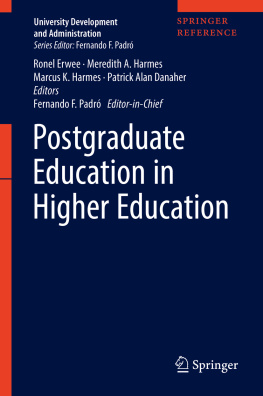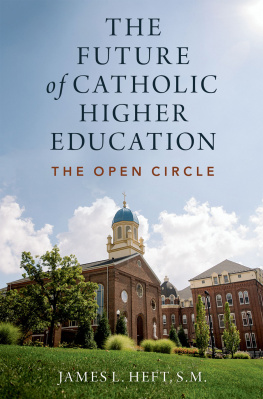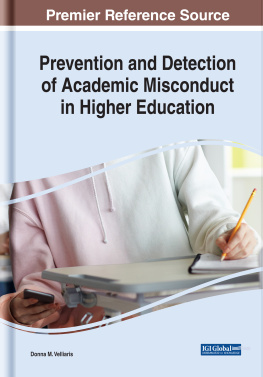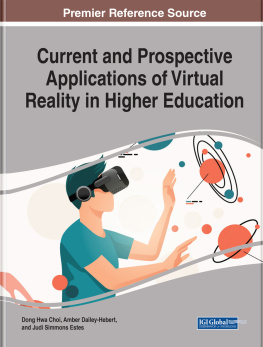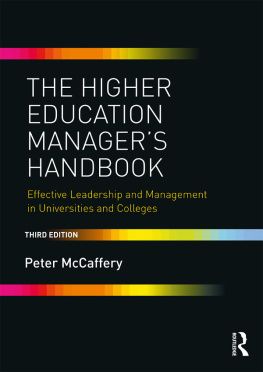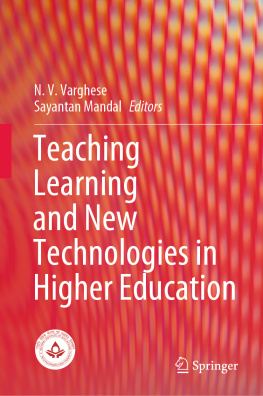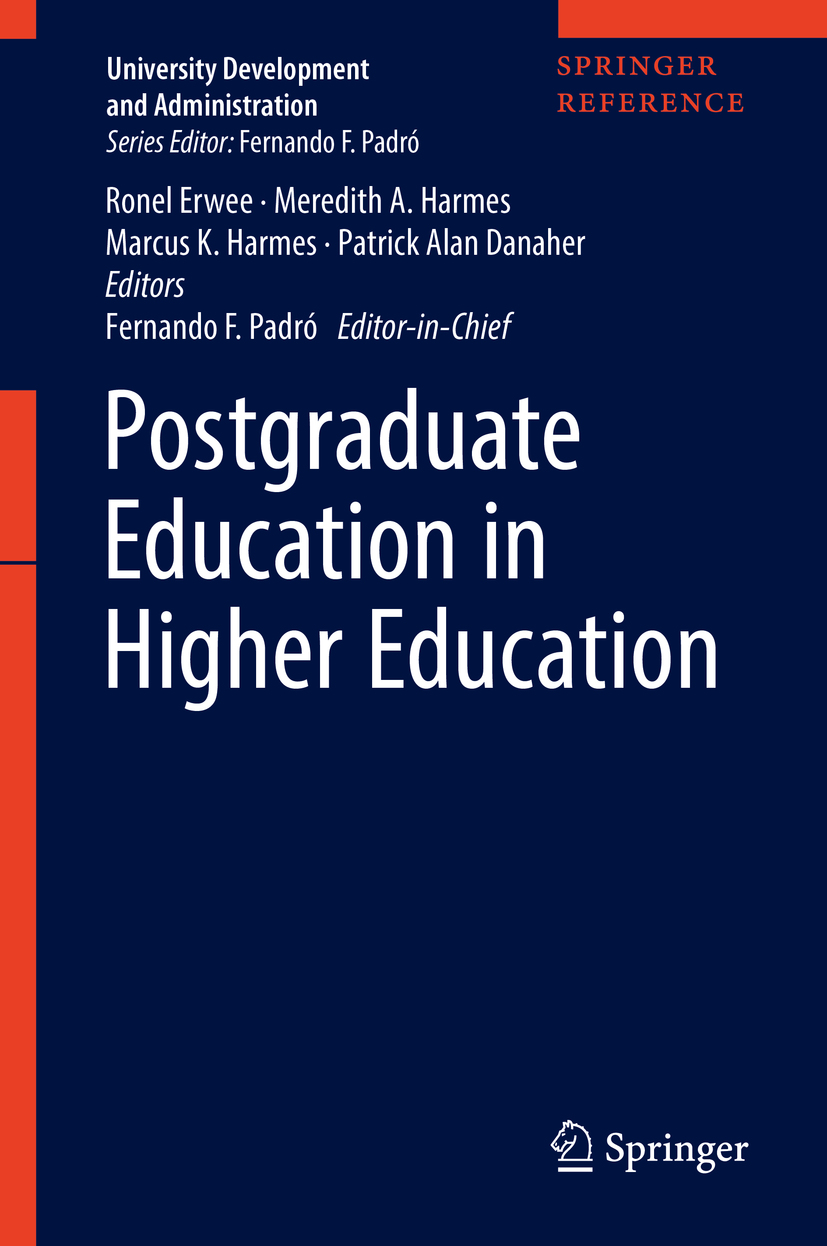University Development and Administration
Series Editor
Fernando F. Padr
University of Southern Queensland, Toowoomba, QLD, Australia
It is a generational work designed to take a comprehensive and utilitarian look at higher education in the first decade of the twenty-first century and to provide a glimpse of potential developments as the century progresses. In this regard, it combines many of the intentions found in the three antecedent works previously described. This series provides basic and (per force) historical perspectives on topics covered that touch upon the impact and approach within universities regarding issues of social justice; designing and fostering a climate and structure that promotes the provision of high skills and new knowledge (transmitted and created); creating schema that ensure the quality and integrity of all programs across the campus; issues and approaches toward establishing and maintaining good external and internal governance; the effective management of financial and human resources; the importance of purpose in generating a viable university structure; the impact of changing paradigms in learning, teaching, and student engagement (the changing toward a learner-centered environment); capacities in relation to human and financial resources available to higher education; and the expectations from and performance of higher education institutions.
More information about this series at http://www.springer.com/series/14341
Editors
Ronel Erwee
School of Management and Enterprise, University of Southern Queensland, Toowoomba, QLD, Australia
Meredith A. Harmes
Open Access College, University of Southern Queensland, Toowoomba, QLD, Australia
Marcus K. Harmes
Open Access College, University of Southern Queensland, Toowoomba, QLD, Australia
Patrick Alan Danaher
School of Linguistics, Adult and Specialist Education, University of Southern Queensland, Toowoomba, QLD, Australia
CQUniversity, Rockhampton, QLD, Australia
University of Helsinki, Helsinki, Finland
Editor-in-Chief
Fernando F. Padr
Open Access College, University of Southern Queensland, Toowoomba, QLD, Australia
ISSN 2522-5626 e-ISSN 2522-5634
University Development and Administration
ISBN 978-981-10-5247-7 e-ISBN 978-981-10-5249-1
https://doi.org/10.1007/978-981-10-5249-1
Library of Congress Control Number: 2018941838
Springer Nature Singapore Pte Ltd. 2018
This work is subject to copyright. All rights are reserved by the Publisher, whether the whole or part of the material is concerned, specifically the rights of translation, reprinting, reuse of illustrations, recitation, broadcasting, reproduction on microfilms or in any other physical way, and transmission or information storage and retrieval, electronic adaptation, computer software, or by similar or dissimilar methodology now known or hereafter developed.
The use of general descriptive names, registered names, trademarks, service marks, etc. in this publication does not imply, even in the absence of a specific statement, that such names are exempt from the relevant protective laws and regulations and therefore free for general use.
The publisher, the authors and the editors are safe to assume that the advice and information in this book are believed to be true and accurate at the date of publication. Neither the publisher nor the authors or the editors give a warranty, express or implied, with respect to the material contained herein or for any errors or omissions that may have been made. The publisher remains neutral with regard to jurisdictional claims in published maps and institutional affiliations.
This Springer imprint is published by Springer Nature
The registered company is Springer Nature Singapore Pte Ltd.
The registered company address is: 152 Beach Road, #21-01/04 Gateway East, Singapore 189721, Singapore
Memoriam
As the volume progressed to its halfway point, Professor Ronel Erwee unexpectedly passed away in March 2017 after a short illness. Her warmth and caring to colleagues and friends is sorely missed; however, her sense of detail and preparation are noted throughout this volume because of her diligent work in reviewing a number of the chapters and her guidance in shaping the approach and content that are found within these pages. This volume is dedicated to her memory.
Ronel was a Professor in the Faculty of Business, Education, Law and Arts, University of Southern Queensland (USQ), Australia. Moving from South Africa, she arrived at USQ in 1998, teaching in the areas of International Management, People Development and Team Leadership, and in the DBA program as well as supervising Ph.D. and DBA candidates. Her areas of research include Strategic Thinking, International Human Resource Management, Knowledge Management, Managing Diversity, Leadership, and Organizational Change. Above all else, she was noted for her dedication and care on the topics of postgraduate education and research supervision. Her colleagues esteem for her devotion inspired the creation of the Ronel Erwee Memorial Award for Excellence in Postgraduate Research Supervision given to groups or individuals demonstrating specific contributions to the advancement of HDR student research culture and/or HDR student supervision practices at USQ.
I also need to take this opportunity to thank Drs. Marcus and Meredith Harmes for the willingness to enter into this project media in res and help complete the request, review, and other administrative processes that are part of creating a volume such as this one. Their contributions have been significant, building on and completing the work that was either incomplete or still undone.
University Development and Administration Handbook Series
Fernando F. Padr
Editor-in-Chief
Preface
What is the purpose of postgraduate higher education in todays world? Massification has made these degrees more available in industrialized countries as part of a paradigm shift within the knowledge society; however,
Planning postgraduate education and research provision in middle- and low-incomes countries are very complex processes This situation obliges governments and higher education institutions to strategically choose programmes and delivery likely to: (i) sustain national development priorities; (ii) invest available resources prudently; (iii) provide quality assurance measures, and (iv) foresee career opportunities for postgraduate students (UNESCO 2008, p. 8).
Masters and doctoral degrees have traditionally been part of what Maturana and Valera (1980) and later Luhmann (1995) indicated as part of organizational reproduction ( autopoiesis ). In an era of reduced government funding and rising operational costs, fewer academic positions especially full-time academic positions are available as academic retire. On the other hand, the socioeconomic need to increase national and personal intellectual capital in a knowledge-driven world does provide impetus for these higher degrees to meet job flow (the gross creation and destruction of jobs, reflecting the expansion and contraction of establishments Burgess et al. 2000, p. 474) demands in the economy.

